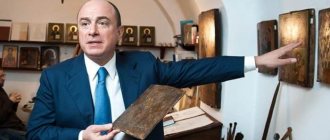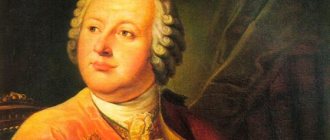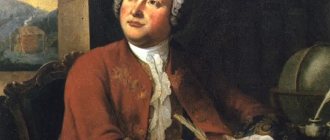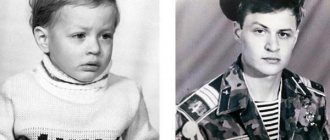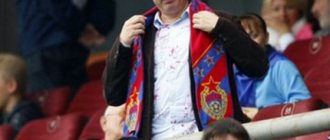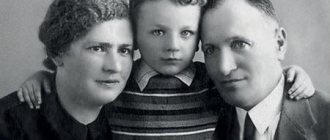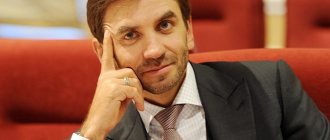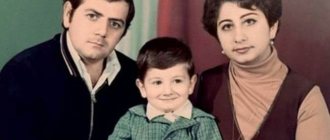Glorious family
Mikhail Illarionovich came from the Golenishchev-Kutuzov family. According to one version, his ancestor was Gavrila Aleksich: an associate of Alexander Nevsky became famous for his military prowess in the Battle of the Neva. The field marshal's father began serving under Peter I. A talented military engineer designed the Catherine Canal in St. Petersburg to prevent the disastrous consequences of Neva floods.
Illustration: still from the film “Alexander Nevsky”. From left to right: Vasily Buslaev, Alexander Nevsky and Gavrila Aleksich
Personal life
According to rumors, the commander’s first lover was a certain Ulyana Alexandrovich, who came from the family of the Little Russian nobleman Ivan Alexandrovich. Kutuzov met this family as a little-known young man with a low rank.
Mikhail began to often visit Ivan Ilyich in Velikaya Krucha and one day he took a fancy to a friend’s daughter, who responded with mutual sympathy. Mikhail and Ulyana began dating, but the lovers did not tell their parents about their affection. It is known that at the time of their relationship the girl fell ill with a dangerous disease for which no medicine could help.
Ulyana's desperate mother swore that if her daughter recovered, she would definitely pay for her salvation - she would never get married. Thus, the parent, who delivered an ultimatum to the girl’s fate, doomed the beauty to the crown of celibacy. Ulyana recovered, but her love for Kutuzov only increased; they say that the young people even set a wedding day.
However, a few days before the celebration, the girl fell ill with a fever and, fearing God’s will, rejected her lover. Kutuzov no longer insisted on marriage: the lovers parted ways. But the legend says that Alexandrovich did not forget Mikhail Illarionovich and prayed for him until the end of her years.
It is reliably known that in 1778 Mikhail Kutuzov proposed marriage to Ekaterina Ilyinichna Bibikova and the girl agreed. The marriage produced six children, but the first-born Nikolai died in infancy from smallpox.
Catherine loved literature, theaters and social events. Kutuzov’s beloved spent more money than she could afford, so she repeatedly received reprimands from her husband. Also, this lady was very original; contemporaries said that already in old age, Ekaterina Ilyinichna dressed like a young lady.
It is noteworthy that little Vanya Turgenev, the future great writer who invented the nihilist hero Bazarov, managed to meet Kutuzov’s wife. But because of her eccentric outfit, the elderly lady, whom Turgenev’s parents revered, made an ambiguous impression on the boy. Vanya, unable to withstand his emotions, said:
“You look just like a monkey.”
The myth of the commander
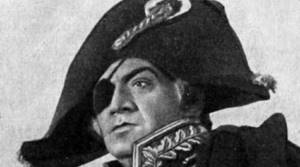
Contrary to existing opinion, there is no confirmation of the fact that the commander was blind in his right eye. Just as there is not a single written mention of the bandage by contemporaries. In all lifetime portraits, the field marshal is depicted without her. For the first time, the notorious bandage, like a pirate’s, appeared on Kutuzov’s part in 1943 in the film of the same name. The Second World War was going on, and the viewer needed to be shown that even after being seriously wounded one could continue to fight.
Illustration: still from the film “Kutuzov”. Alexey Dikiy as Mikhail Kutuzov
Bright mind
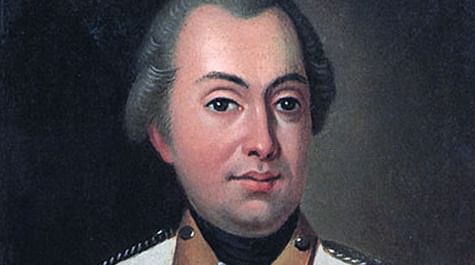
Having received a serious education at home, Mikhail Kutuzov graduated from the Artillery and Engineering Gentry Cadet Corps. By the age of 14, he helped teachers teach geometry and arithmetic to students. He knew French, English, German, Swedish, and Turkish perfectly well. The famous French writer Madame de Stael, after a conversation with Kutuzov, noticed that the Russian general spoke French better than the Corsican Bonaparte.
Illustration: Portrait of M.I. Kutuzov in the uniform of a Colonel of the Lugansk Pike Regiment
Experienced courtier
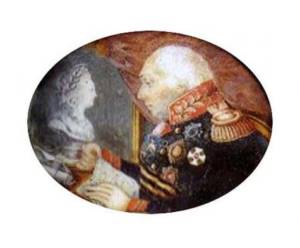
Mikhail Kutuzov knew how to find a common language with rulers. He was favored not only by Catherine II - he also achieved the favor of Emperor Paul, who fell into disgrace with numerous associates of his mother-empress. Contemporaries noted that Mikhail Illarionovich was the only one with whom both Catherine the Great and Paul the First spent their last evening on the eve of their death.
Illustration: Kutuzov in front of the bust of Catherine II. Miniature by unknown artist
Cunning fox
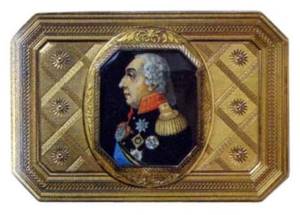
Restraint, prudence, secrecy, the ability to flatter - these are the qualities with which contemporaries characterized Kutuzov. He gained a reputation as a cunning man, and Napoleon called him “the old fox of the North.” According to acquaintances, the character of the future commander was influenced by an incident during his service in the army of Field Marshal Pyotr Rumyantsev. Kutuzov, among his friends, imitated the military leader. For fun, I copied his mannerisms, voice and gait. The lieutenant colonel's prank was reported to the commander-in-chief, and young Kutuzov was punished: he was sent from the Moldavian army to the second Crimean army.
Illustration: Snuff box with a portrait of M.I. Kutuzova
What happened before the Russian-Turkish wars?
The biography of Mikhail Illarionovich Kutuzov, in the minds of many people, begins with the period of the Russian-Turkish wars. This stereotype has developed due to the fact that in history textbooks, reference books and other scientific literature almost no attention is paid to the beginning of his real military service.
Meanwhile, he did not gain practical experience during battles with the Turks. Beginning in 1764, Mikhail Illarionovich served under the direct command of I. I. Weimarn, who at that time held the rank of lieutenant general. Weimarn led Russian troops based in Poland. Mikhail Illarionovich commanded small mobile detachments opposing the actions of the Confederates.
It was at this time that the field marshal mastered strategy and tactics in practice, learned how to properly use the combat units and resources at his disposal. Then he learned to wait, wear down the enemy, confuse and deceive him.
In 1767, Mikhail Illarionovich Kutuzov again said goodbye to the “real army,” but not for long. He had to take part in the work on an important document establishing the legal foundations of the Russian Empire as an enlightened monarchical state. The preparation of this document was carried out by a separate team of specialists, which was called the “Commission for the Drawing up of a New Code”. He was hired as a secretary-translator because he was fluent in the following languages:
- French;
- German;
- Latin.
This experience revealed the talents of a statesman in the field marshal and was very useful to him when carrying out diplomatic missions.
In 1770, Mikhail Illarionovich returned to the “real army.” It came into the possession of Field Marshal General P. A. Rumyantsev, who fought against the Turks.
Suvorov warrior
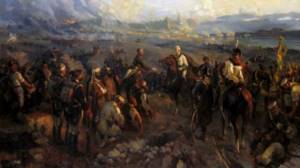
Under the command of Alexander Suvorov, Mikhail Kutuzov was listed more than once. It was the future generalissimo who noticed that the recruit of the Astrakhan regiment, Kutuzov, had a penetrating mind and exceptional fearlessness. After the victorious assault on Izmail, Suvorov wrote: “General Kutuzov walked on my left wing, but was my right hand.”
Illustration: Suvorov’s capture of the Izmail fortress. Painting by A. Sokolov
Kutuzov “Providence itself saved him from two mortal wounds”
Mikhail Illarionovich Kutuzov
(5.9.1745–16.4.1813) – great commander. The victory in the Patriotic War of 1812 and the expulsion of Napoleon's all-European army from Russia forever immortalized the name of Kutuzov. He went through the school of Rumyantsev-Zadunaisky and Suvorov, adopted their invincible military and patriotic spirit, but as a commander he had his own, unique face. His strategy was based on the art of defensive warfare, achieving victory through battles and operations extended in time and space, but united by a single plan. Along with examples of courageous leadership of troops on the battlefield, he gave an invaluable example of an organizer of a military victory.
Mikhail Kutuzov (Golenishchev-Kutuzov) was born into a noble family that had ancestral roots on Novgorod soil. His father, a military engineer, lieutenant general and senator, had a great influence on the education and upbringing of his son. Since childhood, Kutuzov was gifted with a strong build, combining inquisitiveness, enterprise and agility with thoughtfulness and a kind heart. He received his military education at the artillery and engineering school, which he graduated from in 1759 among the best, and was retained as a teacher at the school. In 1761, he was promoted to the first officer rank (ensign) and, at his own request, was sent as a company commander to the Astrakhan Infantry Regiment. Due to his excellent knowledge of languages (German, French, and subsequently Polish, Swedish and Turkish), in 1762 he was appointed adjutant to the Governor-General of Revel. In 1764–1765 served in Poland in the troops of N. Repnin.
From 1770, during the decisive events of the Russian-Turkish war of 1768–1774, Kutuzov was sent to the 1st Danube Army under Field Marshal Count P.A. Rumyantsev-Zadunaisky. As a combatant and staff officer, he took part in the battles that were the pride of Russian weapons - at Ryaboya Mogila, Larga and Kagul. As chief of staff of the corps, he distinguished himself in the battle of Popesti (1771) and was promoted to the rank of lieutenant colonel.
In 1774, in a battle with the Krymchaks near Alushta, with a banner in his hand, he led soldiers into battle; while pursuing the enemy, he was seriously wounded: a bullet entered below the left temple and exited near the right eye. Mikhail Illarionovich was awarded the Order of St. George 4th degree and sent by Catherine II for treatment abroad. While recovering, he simultaneously became acquainted with the experience of military affairs in Austria and Prussia, and had a conversation with Frederick II the Great.
In 1776, upon returning to Russia, Kutuzov was sent by the Empress to Crimea to help Suvorov, who ensured order there. Gained his trust by performing important tasks; on the recommendation of Suvorov, he received the rank of colonel (1777), and then brigadier (1782). In 1784, on behalf of G. Potemkin, he negotiated with Crimea-Girey, the last Crimean Khan, convinced him of the need to abdicate the throne and recognize Russia’s rights to the lands from the Bug to the Kuban; for this he was awarded the rank of major general.
From the next year, Mikhail Illarionovich commanded the Bug Jaeger Corps, which he himself formed. During the Russian-Turkish War of 1787–1791. Kutuzov, as part of Potemkin’s Yekaterinoslav army, took part in the siege of Ochakov (1788). Here, while repelling a Turkish attack, he was seriously wounded for the second time (a bullet hit the cheek and exited the back of the head). When he recovered, the doctor who treated him remarked: “Apparently, Providence is preserving this man for something extraordinary, because he was healed of two wounds, each of which was fatal.” The very next year, commanding a separate corps, Kutuzov successfully fought at Akkerman and Kaushany, participated in the capture of Bender by Potemkin, and received new awards.
In November 1790, Kutuzov joined Suvorov’s troops storming Izmail. “General Kutuzov walked on my left wing,” said Suvorov, “but was my right hand.” At one point, when the success of the assault seemed doubtful, a messenger from Suvorov informed Mikhail Illarionovich that he had been appointed commandant of Izmail. Realizing what the commander was calling him to do, Kutuzov was among the first to break into the fortress. For Ishmael, he was promoted to the rank of lieutenant general and awarded the Order of St. George 3rd degree.
Having repelled the attempts of the Turks to regain Izmail, in June 1791 he defeated a 23,000-strong Turkish army at Babadag with a sudden blow. Acting as part of N. Repnin's army, he soon distinguished himself in the battle of Machin, inflicting a decisive blow on the enemy from the flank. Awarded the Order of St. George 2nd degree.
In 1792, Catherine, trusting Kutuzov’s insightful and flexible mind, sent him as ambassador extraordinary and plenipotentiary to Turkey. There he earned great trust from the Turkish court and was able to resolve a number of important diplomatic issues in favor of Russia. In 1794, Mikhail Illarionovich was appointed director of the Land Cadet Corps, proved himself to be a wise mentor and educator, and often himself lectured on tactics and military history. During the reign of Paul I (1796–1801), he successfully completed a two-month diplomatic mission in Prussia, served as Lithuanian governor-general, was promoted to infantry general, and was awarded the Order of St. Andrew the First-Called.
Upon the accession of Alexander I to the throne, Kutuzov was appointed to the post of Governor-General of St. Petersburg. Not finding mutual understanding with the young Emperor, he resigned in 1802 and went to the village. However, his rest was short-lived: in August 1805, he was appointed commander-in-chief of the Russian army, aimed at helping Austria in the war with Napoleon. Having barely entered the borders of Austria, Kutuzov’s army, due to the capitulation of the Austrians near Ulm, found itself face to face with a French army twice its size. From October 13 to November 10, Kutuzov made the famous retreat march from Braunau to Olmutz. Reflecting French attacks from the flanks along the way and hiding behind the rearguards, where Bagration and Miloradovich operated successfully, he left the trap and united with the approaching Russian corps of General Buxhoeveden.
The haste of Alexander I and the Austrian Emperor Franz I who arrived to the troops led to a poorly prepared offensive by the allied armies and their defeat at Austerlitz (November 20). In this battle, Kutuzov only formally served as commander-in-chief of the allied army; he was constrained by the presence of two emperors and the battle plan drawn up by the Austrian General Weyrother. At Austerlitz, next to Kutuzov, the husband of his daughter Tizengauzen, who rushed forward with the banner, died, and Mikhail Illarionovich himself was wounded. In 1806, the war in Europe broke out again, but it took place without the participation of Kutuzov, whom the dissatisfied Tsar assigned to Kyiv as governor-general.
In 1808, Mikhail Illarionovich was sent to the Russian-Turkish war as the commander of the corps of the Moldavian army. In 1809 he was appointed governor general in Vilna. But in 1811, when the war with Turkey reached a dead end, and the growing threat from France foreshadowed trouble, Kutuzov was again appointed to the Moldavian Army, already with the rank of commander-in-chief. Soon he showed his skill as a commander in the battle of Rushchuk, where, under his leadership, 15 thousand Russians defeated a 60 thousand-strong Turkish army. Realizing that pursuing the Turks and fighting them along the Danube line, more than 1000 miles long, was of little prospect, Kutuzov chose a different path to achieve military victory. He deliberately withdrew his army back to the left bank of the Danube, encouraged the enemy to attack, breaking away from the bases, and achieved the dismemberment of the Turkish troops. Then part of his forces captured the right bank of the river and cut off the 40,000-strong Turkish army, lured to the left bank. Having completely blocked it and having almost no losses, Kutuzov forced the Grand Vizier to capitulate. The Bucharest Peace Treaty with Turkey, signed by Kutuzov in May 1812, gave autonomy to Serbia, secured the annexation of Bessarabia to Russia and deprived Napoleon of Turkey as an ally in the impending war against Russia.
Awarded the titles of count and his serene prince for victories over the Turks, the commander was no longer a success at the beginning of the Patriotic War of 1812. While the Russian armies in the west were led by Barclay de Tolly and Bagration, Kutuzov was elected head of the St. Petersburg and then Moscow militias. Only after the surrender of Smolensk to the French, Alexander I was forced to yield to the demands of the troops and appoint Mikhail Illarionovich commander-in-chief over both armies, which by this time had united. “Do you hope to defeat Napoleon?” - they asked Kutuzov at this time. “To break, no, but to deceive, I hope,” he answered with a smile. This answer should be assessed taking into account the more than twofold numerical superiority of the European army united by Napoleon.
Enthusiastically greeted by the population along the way, Kutuzov arrived to the troops on August 17. The Russian officers were tired of retreating, everyone was eager for battle, but Kutuzov was in no hurry. For a few more days he led the army back and stopped at the village of Borodino, where preparations for the battle began, which became necessary psychologically to maintain morale. At dawn on August 26, the Russian army (130 thousand people plus 20 thousand militia in the rear, which did not take part in the battle) met with Napoleon’s army (about 134 thousand). Having built his troops in a deep battle formation, Kutuzov, with an energetic maneuver of forces and means, thwarted all attempts by Napoleon to achieve a decisive advantage, and he himself successfully counterattacked. At the cost of huge losses, the French managed to push back the Russians on the left flank and in the center, but, recognizing the futility of further efforts, Napoleon withdrew his troops to their original positions in the evening. The Russian army lost 44 thousand people in this battle, the French - about 40, but the moral victory remained with Kutuzov: he destroyed Napoleon’s dream of winning the war in one battle, and preserved a combat-ready, morally strong army that felt confident in its native Russian soil.
Carrying out his strategically winning plan for waging war, Kutuzov on September 2 left Moscow to the enemy, completely burned out in the famous fire. All the most valuable things were removed from the capital. There is still debate as to how inevitable this decision was. Tsar Alexander I sent him letters of reproach, but Kutuzov did not fully reveal his plan to anyone. And it is obvious in the fact that the army was retreating along the Ryazan road, while all its material supplies were quietly sent to Kaluga. The headquarters officers were perplexed. Having convinced the French that the Russian army was weakened and was leaving to the east, Kutuzov secretly maneuvered west to the village of Tarutino on the Nara River, thereby blocking the French from going south, where they could get food and fodder. At this time, the Russian army began to be replenished with reserves, and partisan warfare began behind enemy lines. Realizing the critical situation, Napoleon sent an adjutant to Kutuzov with a proposal for peace negotiations, but he replied that the war was just beginning. The famous fable by I. Krylov “The Wolf in the Kennel” dates back to this time, which Mikhail Illarionovich himself read with pleasure.
Unlike the conquered capitals of other countries, Moscow expressed complete contempt for the Masonic usurper. The fire of Moscow was an incomprehensible and unprecedented “reception” for him. Thus, Napoleon’s grandiose plans to be crowned “Emperor of the Universe” in the Third Rome were doomed to failure. Having left Moscow on October 7, Napoleon moved to Maloyaroslavets, where Kutuzov blocked his way and, after a bloody battle, forced the French to retreat along the Smolensk road they had destroyed. Having launched a counteroffensive, the Russian army dealt blow after blow to the retreating Napoleonic troops, but trying to prevent their own losses. Hunger and cold increased the demoralization of the French army, and after the Berezina its retreat turned into flight. Napoleon lost more than 500 thousand people in Russia killed, wounded and prisoners, almost all of his artillery and cavalry.
On December 21, Kutuzov, in an order to the army, congratulated the troops on expelling the enemy from Russia. For his skillful leadership of the Russian army in 1812, he was awarded the rank of Field Marshal and the title of Prince of Smolensk. He also received the Order of St. George 1st degree, becoming the first full holder of this Russian Military Order.
Kutuzov met Alexander I’s decision to move the army further west to liberate Europe from the usurper without much enthusiasm: he was concerned about future human losses for the sake of other people’s interests and the possible strengthening of France’s ungrateful European rivals. (Kutuzov was not mistaken in this.) With the arrival of the Tsar to the troops, he gradually withdrew from the main affairs of the command, his health weakened, and on April 16, 1813 in Bunzlau (Prussia, now Poland) he died at the age of 67 years . His body was transported to St. Petersburg, where it was buried in the Kazan Cathedral with the general sadness of the people. Kutuzov himself bequeathed to be buried in this cathedral, consecrated in honor of the miraculous icon of the Mother of God of Kazan, which he revered so much all his life, the copy of which he was in the army during the war and prayers before which, in his opinion, brought victory to the Russian army.
The name of commander Kutuzov forever remained revered by the Russian people and became a proverb. He clearly demonstrated the Russian savvy national character, embodied in the genius of a commander. It was with this that he outplayed the rational and stronger Napoleon - in fact, the entire rational Europe, united by its Masonic leader in a campaign against Orthodox Russia.
Book materials used: Kovalevsky N.F. History of Russian Goverment. Biographies of famous military figures of the 18th – early 20th centuries. M. 1997
PS. In conclusion, it should be said about the often mentioned Freemasonry of M.I. Kutuzov, which the Freemasons also constantly speculate on for their own purposes. Masonic sources claim that in 1779 in Regensburg he joined the lodge “To the Three Keys”. This, of course, is not a very pleasant fact in the biography of the great Russian commander. But what kind of Freemasonry was it if Kutuzov became the winner of the main Freemason of Europe - Napoleon, destroying his plans for coronation in Moscow? What kind of Freemasonry was it in Russia at that time, if, contrary to Napoleon’s expectations, the Russian “brothers” did not present him with the keys to Moscow, but showed resistance. Russian Freemasonry of that time was primarily a tribute to a fashionable fad; people joined lodges as prestigious clubs for the sake of useful acquaintances, “spiritual self-improvement,” “charity,” and mutual assistance in good deeds, without realizing the spiritual essence and political goals of this movement. Kutuzov was not alone in this misconception. Many Russian prominent figures succumbed to this spirit of their time (Pushkin, Griboyedov, etc.). It was the invasion of Napoleon, the prohibition of Freemasonry by Emperor Alexander I in 1822 and then the Masonic revolt of the Decembrists in 1825 that brought clarity to this issue for Russian society.
Permanent page address:
Leave your comment
« Previous entry
Sky near Austerlitz
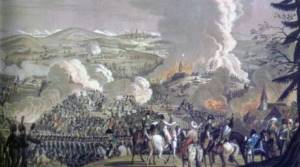
Kutuzov suffered one of his main defeats during the war with Napoleon in 1805. Alexander I and the Austrian Emperor Franz II demanded an offensive against the French. Kutuzov was against it and suggested retreating, waiting for reserves. In the battle of Austerlitz, the Russians and Austrians faced a defeat, which for a long time sowed distrust between Alexander I and Kutuzov. Recalling the defeat, the Russian emperor admitted: “I was young and inexperienced. Kutuzov told me that he should have acted differently, but he should have been more persistent in his opinions.”
Illustration: The Battle of Austerlitz on November 20, 1805. Colorized engraving by I. Rugendas
Patriotic War of 1812
It was military actions against the army of Napoleon Bonaparte in the Russian-French War of 1812 that brought Mikhail Kutuzov fame in Russia and abroad.
When Napoleon's troops entered Russia, the emperor, who still could not forgive Kutuzov for his defeat in the Battle of Austerlitz, placed him at the head of the St. Petersburg and Moscow militia. Only after the French took Smolensk did Alexander I submit to the demands of the people and the army. General Kutuzov was appointed commander-in-chief. When asked if he hoped to defeat Napoleon, Kutuzov smiled and replied: “I hope to deceive him.”
Before his appointment, the emperor granted Kutuzov the princely title.
A lesson in forgiveness
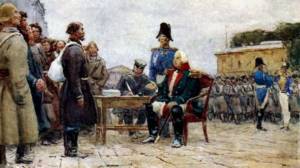
Four months after the Battle of Borodino in Vilna, Kutuzov signed an order for the army: “Brave and victorious troops! Finally, you are on the borders of the Empire, each of you is the savior of the Fatherland... Without stopping among heroic deeds, we now move on. Let us cross the borders and strive to complete the defeat of the enemy on his own fields. But let us not follow the example of our enemies in their violence and frenzy, which humiliates the soldier. They burned our houses, cursed the Holy, and you saw how the right hand of the Most High righteously noted their wickedness. Let us be generous and make a distinction between the enemy and the civilian. Justice and meekness in dealing with ordinary people will show them clearly that we do not want their enslavement or vain glory, but we are seeking to free even those very peoples who armed themselves against Russia from disaster and oppression.”
Illustration: M.I. Kutuzov is the head of the St. Petersburg militia. Painting by S. Gerasimov
Farewell to the whole world
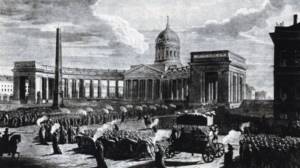
Kutuzov was against the emperor's plan to pursue Napoleon in Europe, but duty obliged him to obey. The seriously ill military leader did not reach Paris. Kutuzov died in the Prussian city of Bunzlau. The emperor ordered the field marshal's body to be embalmed and delivered to St. Petersburg. It took a month and a half to transport the coffin to the Northern capital: we had to stop. Everywhere people wanted to say goodbye to Kutuzov and show worthy honors to the savior of Russia.
Illustration: Funeral of M.I. Kutuzova. Engraving by M.N. Vorobyova.
battle of Borodino
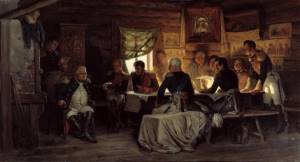
On August 17, Kutuzov took command of the army. Until August 26, the troops slowly retreated under the pressure of Napoleon's superior forces.
M. I. Kutuzov decided to conduct the decisive battle on the Borodino field. The Battle of Borodino took place on August 26. According to various estimates, up to 250,000 people took part in the battle. Losses on both sides amounted to about 90 thousand. None of the fighting armies achieved a clear victory.
The battle was expected to continue the next day. But it turned out that the losses were too great. Kutuzov decided to withdraw troops from combat positions.
Formally, the battlefield remained with the enemy. But the Russians had the moral advantage. Napoleon's dream of winning a single battle was dashed. Kutuzov retained an army capable of continuing the war.
On August 30, Alexander I signed a decree conferring the rank of field marshal on Mikhail Illarionovich Kutuzov.
On September 2, Kutuzov’s troops left Moscow. When Napoleon entered the cities, he saw neither the delegation for negotiations nor the crowd of curious townspeople. The city was empty. There are about 10 thousand residents left in the city.
On September 15, Napoleon entered the Kremlin. The night before, the first fires started in the city. Bonaparte realized that the chance of victory was irretrievably lost. A few years later, a few days before his death, the French emperor would say: “I should have died immediately after I entered Moscow.”
The flames quickly engulfed the wooden city. Moscow was burning. The weather helped the partisans: a fierce wind fanned the fire from the slightest spark. Napoleon had to flee from the Kremlin until the fire blocked all exits.
From the Petrovsky Palace, he proposed peace negotiations to Kutuzov. Field Marshal Kutuzov’s answer was brief: “The war is just beginning.”
On October 7, Napoleon's army left Moscow. Kutuzov left only the Smolensk road for the French army to retreat. The same one along which they destroyed all the settlements, advancing on the capital of Russia. He forced them to retreat across the land they had devastated.
The Russian army launched a counter-offensive. Kutuzov dealt Napoleon several heavy blows. Hunger and cold finally broke the morale of the French troops. After the battle of the Berezina, the French retreat turned into flight.
On December 21, Kutuzov congratulated Russian troops on the expulsion of Napoleonic troops from Russia.
The Emperor ordered the pursuit of Napoleon's army. The Russian army went to Poland and Prussia. Kutuzov's health was deteriorating. On April 28, 1813, Mikhail Illarionovich Kutuzov died in Bunzlau. He was buried in the Kazan Cathedral in St. Petersburg, where huge crowds mourned their great commander, the “Savior of the Fatherland,” as Kutuzov was popularly called.
